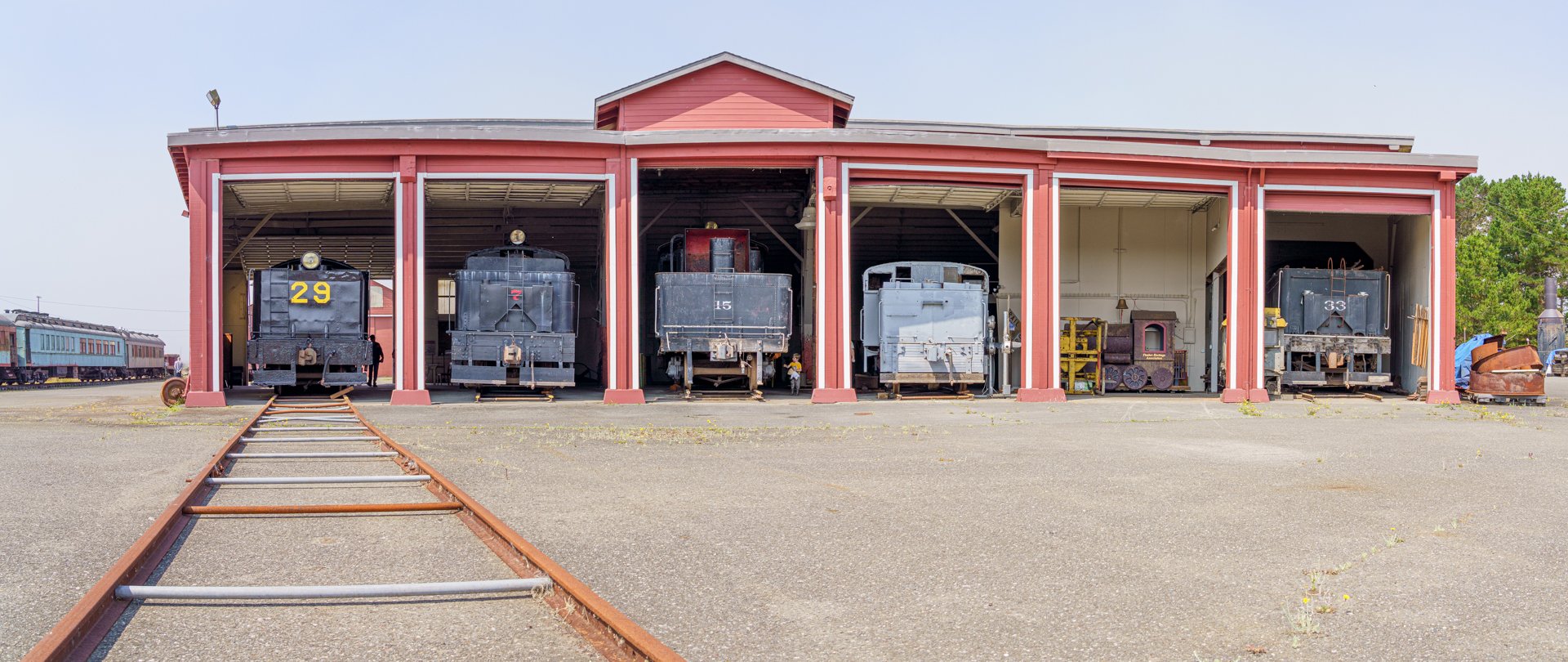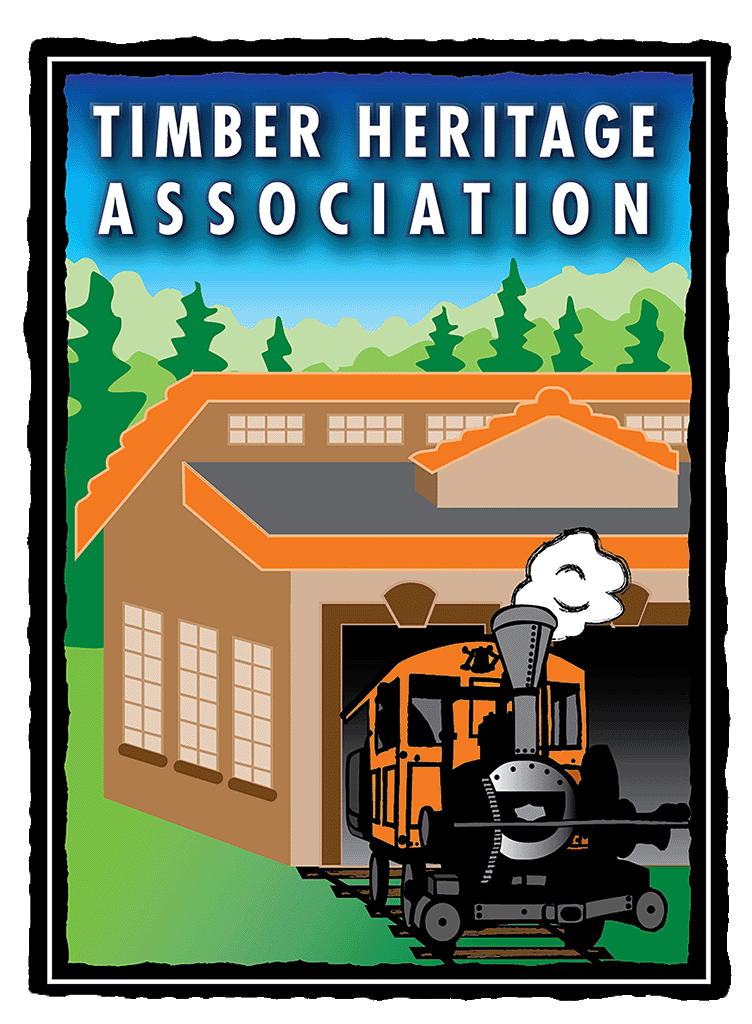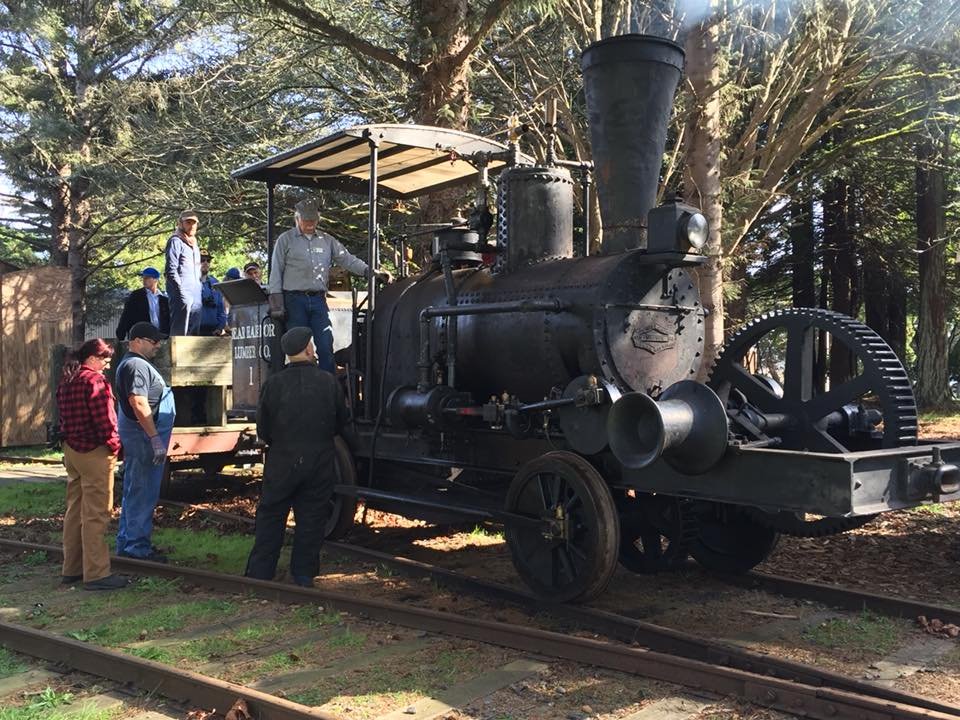
The Motive Power of Timber Heritage
| Name | Builder | Year | Type | Tons | Location | Status |
|---|---|---|---|---|---|---|
| Arcata & Mad River Railroad #7 |
Lima | 1918 | 2-truck Shay | 50 | Samoa, CA | Non-operational |
| Arcata & Mad River Railroad #101 |
GE | 1950 | 44-ton Diesel | 44 | Samoa, CA | Operational |
| Bear Harbor Lumber Company #2 |
Baldwin | 1898 | 2-4-2t | 24 | Samoa, CA | Non-operational |
| Dolbeer & Carson Lumber Company #3 |
Baldwin | 1922 | 2-6-2 | 63 | Samoa, CA | Non-operational |
| Hammond Lumber Company #15 |
Baldwin | 1916 | 2-8-2 | 90 | Samoa, CA | Non-operational |
| Hammond Lumber Company #33 |
Lima | 1922 | 3-truck Shay | 90 | Samoa, CA | Non-operational |
| Mutual Plywood #54 | Heisler | 1927 | B-B Diesel | 24 | Samoa, CA | In restoration |
| Pacific Lumber Company #29 |
Baldwin | 1910 | 2-6-2 | 60 | Samoa, CA | Non-operational |
| The following are maintained and operated by THA, and are owned by the California State park at Fort Humboldt, Eureka. | ||||||
| Falk | Marshutz & Cantrell | 1884 | 0-4-0 | 9 | Fort Humboldt SHP | In maintenance |
| Gypsy | Marshutz & Cantrell | 1892 | 0-4-0 | 12 | Fort Humboldt SHP | In maintenance |
Arcata & Mad River Railroad #7
Builder & Year: Lima 1918
Type: 2-truck Shay
Weight: 50 tons
Construction #: 3014
Location: Samoa Roundhouse
Status: Non-operational
Built in 1918 for the Lamson Logging Company in Euphala, Washington as their No. 1, this locomotive was purchased second-hand by A.& M.R.R. in 1942. It hauled logs and lumber freight the 7.5 miles between Korbel and Korblex and on the 10 mile Northern Redwood Lumber Company logging railroad. In 1956 Simpson Redwood Company purchased the N.L.R. and A.& M.R.R. and abandoned the logging railroad out of Korbel. No. 7 was donated to city of Arcata, California, for display in a city park. From 1970 to 73 it was returned to service on A.& M.R. to pull a tourist train. After again being retired and returned to the city, it was leased to the Association by the City of Arcata to restore in 1986. The City of Arcata sold the locomotive to THA in 2001 for $1.
Built in 1950, the railroad’s first diesel locomotive was purchased used from the Pine Flat Dam Contractors in 1953. The railroad eventually bought three of these 44-ton diesels. Steam locomotives continued to work in the woods above Korbel and the diesels handled lumber shipments from Korbel to Korblex (Arcata) where the railroad interchanged with the Northwestern Pacific Railroad. When the logging railroad shut down in 1956, the diesels still operated on the 7.5 mile line to Arcata. Besides Simpson Timber Co. loads, fifteen other lumber mills were served and the line was quite profitable. The railroad operated with No. 101, 102, and 104 until 1983 when a reduction in the number of shippers and a Southern Pacific per-car-surcharge dried up traffic. No 101 was sold in 1987 to the MeadWestvaco Company in DeRidder, Louisiana. New Caterpillar power replaced the two original engines in 1999. By 2000, MeadWestvaco’s rail operation was closed and the locomotive was donated to THA. In 2005, after an 18 year absence, the No. 101 was moved to Eureka via rail flat car and truck. It has now been fully restored and is operated frequently by volunteers on the in house track at the Timber Heritage complex.
Arcata & Mad River Railroad #101
Builder & Year: General Electric 1950
Type: Diesel Switcher
Weight: 44 tons
Construction #: 30473
Location: Samoa Car Barn
Status: Operational
Bear Harbor Lumber Company #2
Builder & Year: Baldwin 1898
Type: 2-4-2t
Weight: 44 tons
Construction #: 15832
Location: Samoa Roundhouse
Status: Non-operational
This second locomotive was purchased when early plans to extend the railroad to the Eel River were made. Delivered by steamer from San Francisco, it was unloaded at Bear Harbor. It was operated only a short time until the railroad shut down in late 1905. Stored outside for many years, parts were stolen; it was donated to THA in derelict condition in 1979 by heirs of Bear Harbor Lumber Co. owners.
Humboldt Northern Railway / Dolbeer and Carson Lumber Company #3
Builder & Year: Baldwin 1922
Type: 2-6-2
Weight: 63 tons
Construction #: 55248
Location: Samoa Machine Shop
Status: Non-operational, under evaluation for restoration
Humboldt Northern Railway No. 3 was purchased new in 1922. It operated from Samoa to north of Fieldbrook (Lindsey Creek basin). The locomotive was painted Olive Green and Aluminum for the eleven years it operated on the Humboldt Northern. When owner Dolbeer & Carson Lumber Company’s timber was logged out, the line was sold in 1927 to the Little River Redwood Co., though Dolbeer & Carson continued to run trains until 1930. The locomotives, including No. 3, were then sold to the Dolbeer & Carson Lumber Co. and moved to a newly built D & C logging railroad on the north fork of the Elk River (south of Eureka). In 1950, Pacific Lumber Co. purchased Dolbeer & Carson and closed the railroad three years later. No. 3 was sold by the Purdy Co. (scrappers) to the Stockton Terminal & Eastern Railroad. It served as backup to their diesel and was used on excursions until 1955. No. 3 was then stored unserviceable for 32 years in the engine house. In 1987, it was donated to the California State Railroad Museum. While reducing the size of their collection in 2008, it was donated to THA as it originally operated out of Samoa. It was moved to Samoa by truck in 2009. At CSRM it had been evaluated and found to be a good candidate for restoration; it was partially dismantled and ultra-sound tested in preparation for restoration when CSRM had to reduce the size of the collection.
Former Humbird Lumber Co. No.4, Mason County Logging Co. No. 12 at Bordeaux, WA, this locomotive was purchased by Hammond Lumber Co. December 7th 1941 and renumbered No. 15. It worked mostly pulling log trains from Crannell to Samoa. After the first diesel was purchased, No. 15 was used only when the diesel was out of service. Hammond became Georgia Pacific in 1956. About a year before the railroad was shutdown completely, No. 15 was donated to the city of Eureka, California, for display at Sequoia Park (1960). The city donated the locomotive to the Association in 1979. No. 15 is housed at the THA’s Samoa Roundhouse. It was moved back into the roundhouse in 2009, almost 50 years after it left.
Hammond Lumber Company #15
Builder & Year: Baldwin 1916
Type: 2-8-2
Weight: 90 tons
Construction #: 43563
Location: Samoa Roundhouse
Status: Non-operational
Purchased to haul logs over the steeper grades east of Cranell, No. 33 survived various company name changes: Hammond Lumber Co., Hammond & Little River Redwood Co., Ltd., Hammond Redwood Co., and finally back to Hammond Lumber Co. In 1944 it was sold to the Pickering Lumber Corporation where it was operated in the Sierras for 19 years. After logging trains were discontinued, it was sold to the Westside & Cherry Valley Railway tourist line in 1976; unneeded by the line, it was sold to the Association in 1981.
Hammond Lumber Company #33
Builder & Year: Lima 1922
Type: 3-truck Shay
Weight: 90 tons
Construction #: 3180
Location: Samoa Roundhouse
Status: Non-operational
Mutual Plywood Corporation #54
Builder & Year: Heisler 1927
Type: B-B Diesel converted from 2-truck Heisler
Weight: 24 tons
Construction #: 1546
Location: Samoa Roundhouse
Status: In drivetrain restoration, engine runs
Originally built as Elk River Mill & Lumber Co. No. 3, it worked only 10 years until the mill shut down for good. A junk dealer scrapped the boiler and sold the rest to Mutual Plywood Corp. where a Murphy diesel engine was mounted on the frame and it was used as a mill switcher. In the 1960s it became U.S. Plywood Corp. No. M62; U.S. Plywood was subsequently purchased by Simpson Timber Co. Sold to Frank Bayliss for display at a small tourist railroad at Alton, it was purchased from him by the Association in 1991.
Purchased new in 1910, serving 51 years, it was the last remaining steam locomotive at Pacific Lumber Co. Delivered as a wood burner, it was converted to burn oil during its first summer on the property. It probably hauled lumber to the company wharf at Fields Landing before completion of the Northwestern Pacific Railroad in 1914. It later hauled logs near Freshwater and from South Fork and Carlotta. Log trains ran over the N.W.P. to get to Scotia with P.L. equipment, but N.W.P. crews. Toward the end of her service, No. 29 served as backup for larger steam locomotives and later three diesel locomotives. It was retubed in 1960, then retired in 1961. In serviceable condition, it was stored in the engine house until donated to the Association in 1986.
For additional information, visit this page.
Pacific Lumber Company #29
Builder & Year: Baldwin 1910
Type: 2-6-2
Weight: 60 tons
Construction #: 34484
Location: Samoa Roundhouse
Status: Non-operational, under evaluation for restoration
Elk River Mill and Lumber Company #1, the “Falk”
Builder & Year: Marshutz & Cantrell 1884
Type: 0-4-0t
Weight: 9 tons
Construction #: 1
Location: Samoa Machine Shop
Status: Temporarily non-operational, in transportation for repairs
This “gypsy” type locomotive was purchased by Noah Falk in San Francisco and brought by ship to Arcata, CA. It was first used to haul logs at the Dolly Varden Mill in north Arcata until moved to Falk, California in 1885. Used on the Elk River Mill & Lumber Co. railroad, it was the only locomotive until 1903. In 1900 the railroad was extended five miles up a canyon to new timber. The grade required a larger locomotive and No. 1 was relegated to switching duties near the mill when No. 2 arrived in 1903. In 1927 a third locomotive was purchased and the Falk was retired (No. 3 is in the THA collection but in the 1950s it was converted to a diesel–Mutual Plywood No. 54).
The Falk was given to the city of Eureka, California, for use in a 1937 Fourth of July parade operating on street car tracks on Second Street in Eureka. It was then displayed at Fort Humboldt and given to the State of California when the military fort became a state park. Restored by Timber Heritage Association volunteer labor and State Parks funding in 1986, it operates monthly during the summer at Fort Humboldt State Historic Park Logging Exhibit. Owned by the City of Eureka, loaned to California State Parks. There are only 12 locomotives anywhere in the U.S. or Canada that are older than the Falk that still operate.
Bear Harbor Lumber Co. #1, the “Gypsy”
Builder & Year: Marshutz & Cantrell 1893
Type: 0-4-0t
Weight: 12 tons
Construction #: 8100
Location: Fort Humboldt State Park
Status: Temporarily non-operational, awaiting maintenance
The Bear Harbor “Gypsy” locomotive was built in 1893 by Marshutz & Cantrell in San Francisco and brought north for use at the Bear Harbor Lumber Company. Designed for the rugged terrain of Northern California’s coastal logging industry, it hauled tanbark and lumber along the Bear Harbor Railroad to the shipping wharf. In the early 1900s, the line was extended to Andersonia, requiring extensive trestles and a tunnel through solid rock. The 1906 San Francisco earthquake and financial struggles led to the railroad’s decline, and operations ceased soon after. The Gypsy was stored for decades until it was donated to the State of California in 1962.
Restored in 1979 through the efforts of volunteers and State Parks staff, the Bear Harbor Gypsy is now part of the Fort Humboldt State Historic Park Logging Exhibit. It remains one of the few surviving examples of a “Gypsy” type locomotive and operates occasionally during summer events. Owned by the State of California, it stands as a testament to the ingenuity and challenges of early logging railroads on the North Coast.









